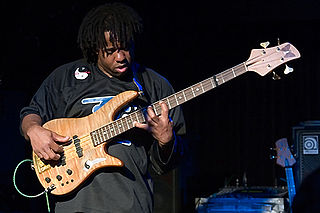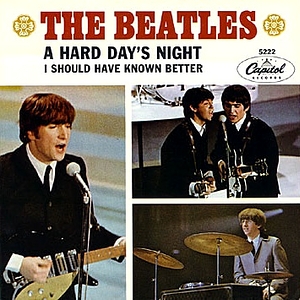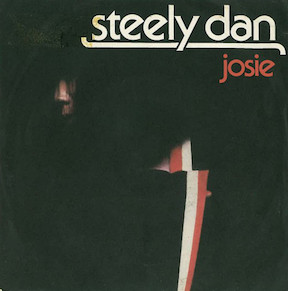Related Research Articles

The term jazz guitar may refer to either a type of electric guitar or to the variety of guitar playing styles used in the various genres which are commonly termed "jazz". The jazz-type guitar was born as a result of using electric amplification to increase the volume of conventional acoustic guitars.

In music performances, rhythm guitar is a technique and role that performs a combination of two functions: to provide all or part of the rhythmic pulse in conjunction with other instruments from the rhythm section ; and to provide all or part of the harmony, i.e. the chords from a song's chord progression, where a chord is a group of notes played together. Therefore, the basic technique of rhythm guitar is to hold down a series of chords with the fretting hand while strumming or fingerpicking rhythmically with the other hand. More developed rhythm techniques include arpeggios, damping, riffs, chord solos, and complex strums.
Hard bop is a subgenre of jazz that is an extension of bebop music. Journalists and record companies began using the term in the mid-1950s to describe a new current within jazz that incorporated influences from rhythm and blues, gospel music, and blues, especially in saxophone and piano playing.

Horace Ward Martin Tavares Silver was an American jazz pianist, composer, and arranger, particularly in the hard bop style that he helped pioneer in the 1950s.

A bassline is the term used in many styles of music, such as jazz, blues, funk, dub and electronic, traditional music, or classical music for the low-pitched instrumental part or line played by a rhythm section instrument such as the electric bass, double bass, cello, tuba or keyboard. In unaccompanied solo performance, basslines may simply be played in the lower register of any instrument such as guitar or piano while melody and/or further accompaniment is provided in the middle or upper register. In solo music for piano and pipe organ, these instruments have an excellent lower register that can be used to play a deep bassline. On organs, the bass line is typically played using the pedal keyboard and massive 16' and 32' bass pipes.
In jazz, comping is the chords, rhythms, and countermelodies that keyboard players, guitar players, or drummers use to support a musician's improvised solo or melody lines. It is also the action of accompanying, and the left-hand part of a solo pianist.

"A Hard Day's Night" is a song by the English rock band the Beatles. Credited to Lennon–McCartney, it was written by John Lennon, with some collaboration from Paul McCartney. It was released on the film soundtrack of the same name in 1964. It was also released in the UK as a single, with "Things We Said Today" as its B-side.
Song structure is the arrangement of a song, and is a part of the songwriting process. It is typically sectional, which uses repeating forms in songs. Common forms include bar form, 32-bar form, verse–chorus form, ternary form, strophic form, and the 12-bar blues. Popular music songs traditionally use the same music for each verse or stanza of lyrics. Pop and traditional forms can be used even with songs that have structural differences in melodies. The most common format in modern popular music is introduction (intro), verse, pre-chorus, chorus, verse, pre-chorus, chorus, bridge, verse, chorus and outro. In rock music styles, notably heavy metal music, there is usually one or more guitar solos in the song, often found after the middle chorus part. In pop music, there may be a guitar solo, or a solo may be performed by a synthesizer player or sax player.

Song for My Father is a 1965 album by the Horace Silver Quintet, released on the Blue Note label in 1965. The album was inspired by a trip that Silver had made to Brazil. The cover artwork features a photograph of Silver's father, John Tavares Silver, to whom the title song was dedicated. "My mother was of Irish and Negro descent, my father of Portuguese origin," Silver recalls in the liner notes: "He was born on the island of Maio, one of the Cape Verde Islands."

In music, the dominant 7♯9 chord is a chord built by combining a dominant seventh, which includes a major third above the root, with an augmented second, which is the same note, albeit given a different note name, as the minor third degree above the root. This chord is used in many forms of contemporary popular music, including jazz, funk, R&B, rock and pop. As a dominant chord in diatonic harmony, it most commonly functions as a turnaround chord, returning to the tonic.

"Peg" is a song by American rock group Steely Dan, first released on the band's 1977 album Aja. The track was released as single in 1977 and reached number 11 on the US Billboard chart in 1978 and number eight on the Cash Box chart. With a chart run of 19 weeks, "Peg" is tied with "Rikki Don't Lose That Number" and "Hey Nineteen" for being their longest-running chart hit. In Canada, "Peg" spent three weeks at number seven during March 1978.

Jazz improvisation is the spontaneous invention of melodic solo lines or accompaniment parts. It is one of the defining elements of jazz. Improvisation is composing on the spot, when a singer or instrumentalist invents melodies and lines over a chord progression played by rhythm section instruments and accompanied by drums. Although blues, rock, and other genres use improvisation, it is done over relatively simple chord progressions which often remain in one key.

"Rikki Don't Lose That Number" is a single released in 1974 by rock/jazz rock group Steely Dan and the opening track of their third album Pretzel Logic. It was the most successful single of the group's career, peaking at number 4 on the Billboard Hot 100 in the summer of 1974.
Theodore "Teddy" Smith was an American jazz double-bassist.

"FM " is a song by American jazz-rock band Steely Dan, the title theme for the 1978 film FM. It made the US Top 40 that year when released as a single, a success relative to the film. Musically, it is a complex jazz-rock composition driven by its bass, guitar and piano parts, typical of the band's sound from this period; its lyrics look askance at the album-oriented rock format of many FM radio stations at that time, in contrast to the film's celebration of that medium.

This is a list of jazz and popular music terms that are likely to be encountered in printed popular music songbooks, fake books and vocal scores, big band scores, jazz, and rock concert reviews, and album liner notes. This glossary includes terms for musical instruments, playing or singing techniques, amplifiers, effects units, sound reinforcement equipment, and recording gear and techniques which are widely used in jazz and popular music. Most of the terms are in English, but in some cases, terms from other languages are encountered.

"Josie" is a song written by Walter Becker and Donald Fagen and first released by Steely Dan on their 1977 album Aja. It was also released as the third single from the album and performed modestly well, reaching #26 on the Billboard Hot 100 and #44 on the Easy Listening chart that year. It has appeared on several Steely Dan live and compilation albums.
"Aja" is a jazz rock song, with elements of jazz fusion and progressive rock, by the American rock band Steely Dan from the album of the same name, their sixth studio album, released in 1977. Composers Becker and Fagen play guitar and synthesizer, respectively, on the song, with various studio musicians playing the other parts; Fagen sings lead vocals. Production duties were handled by Gary Katz; the album was released through ABC Records. Musically, it is a tonally sophisticated and structurally complex work that was praised on its release as the most ambitious track the duo had ever attempted. The song's lyrics center around the interior monologue of a man who runs to the title character to escape the stresses of his life "up on the hill." Fagen claimed that it was inspired by a relative of someone he knew, who had married a Korean woman named Aja. He has described the song as being about the "tranquility that can come of a quiet relationship with a beautiful woman."
"Doodlin'" is a composition by Horace Silver. The original version, by Silver's quintet, was recorded on November 13, 1954. It was soon covered by other musicians, including with lyrics added by Jon Hendricks. It has become a jazz standard.
"Señor Blues" is a composition by Horace Silver. The original version, by Silver's quintet, was recorded on November 10, 1956. It has become a jazz standard. Silver later wrote lyrics, which were first recorded by Silver's band with Bill Henderson in 1958.
References
- ↑ Keepnews, Peter (June 18, 2014). "Horace Silver, 85, Master of Earthy Jazz, Is Dead". The New York Times .
- 1 2 3 4 5 Meadows, Eddie S. (2013) Jazz: Research and Pedagogy (3rd ed.). Routledge.
- 1 2 Owens, Thomas (1996). Bebop – The Music and Its Players. Oxford University Press. p. 222. ISBN 978-0-19-510651-0.CS1 maint: ref=harv (link)
- 1 2 3 4 Kirchner, Bill "The Dozens: Horace Silver" Archived September 24, 2008, at the Wayback Machine , jazz.com. Retrieved January 1, 2016.
- ↑ McDonough, John (September 2014), "Horace Silver". Down Beat , p. 49.
- ↑ Mason, Stewart. "Steely Dan "Rikki Don't Lose That Number"". AllMusic. Retrieved November 5, 2014.
- ↑ Huey, Steve. "Song for My Father (1964)". Blue Note Records. Retrieved November 5, 2014.